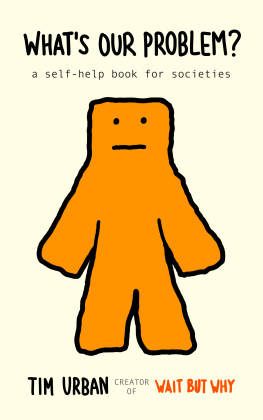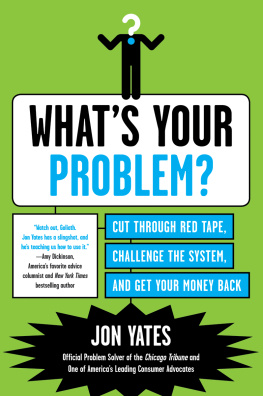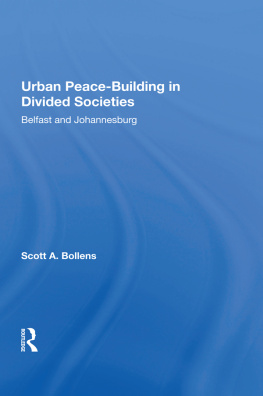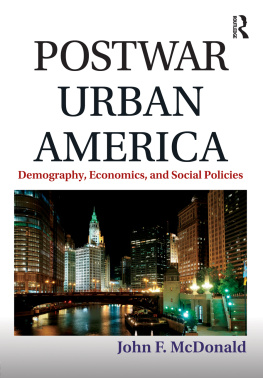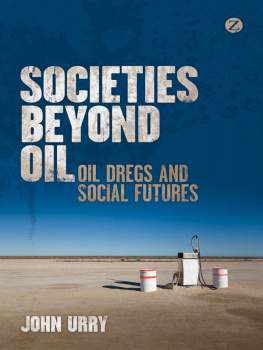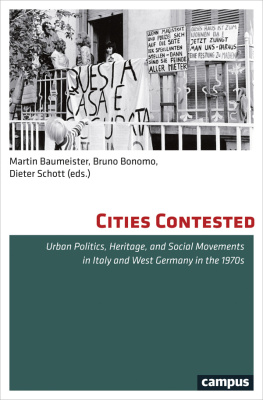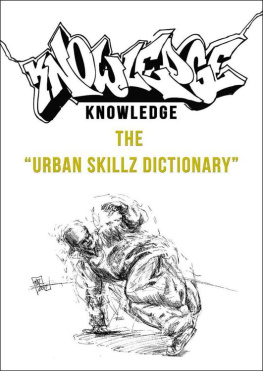Tim Urban - Whats Our Problem? A Self-Help Book for Societies
Here you can read online Tim Urban - Whats Our Problem? A Self-Help Book for Societies full text of the book (entire story) in english for free. Download pdf and epub, get meaning, cover and reviews about this ebook. year: 2023, genre: Politics. Description of the work, (preface) as well as reviews are available. Best literature library LitArk.com created for fans of good reading and offers a wide selection of genres:
Romance novel
Science fiction
Adventure
Detective
Science
History
Home and family
Prose
Art
Politics
Computer
Non-fiction
Religion
Business
Children
Humor
Choose a favorite category and find really read worthwhile books. Enjoy immersion in the world of imagination, feel the emotions of the characters or learn something new for yourself, make an fascinating discovery.
Whats Our Problem? A Self-Help Book for Societies: summary, description and annotation
We offer to read an annotation, description, summary or preface (depends on what the author of the book "Whats Our Problem? A Self-Help Book for Societies" wrote himself). If you haven't found the necessary information about the book — write in the comments, we will try to find it.
Tim Urban: author's other books
Who wrote Whats Our Problem? A Self-Help Book for Societies? Find out the surname, the name of the author of the book and a list of all author's works by series.
Whats Our Problem? A Self-Help Book for Societies — read online for free the complete book (whole text) full work
Below is the text of the book, divided by pages. System saving the place of the last page read, allows you to conveniently read the book "Whats Our Problem? A Self-Help Book for Societies" online for free, without having to search again every time where you left off. Put a bookmark, and you can go to the page where you finished reading at any time.
Font size:
Interval:
Bookmark:
George Santayana, The Life of Reason, Or The Phases of Human Progress, vol. 1 (New York: Charles Scribners Sons, 1905), 284.
Edmund Burke, Reflections on the Revolution in France, and on the Proceedings in Certain Societies in London Relative to That Event (London: Revived Apollo Press, 1814), 35.
Two professors of evolutionary sciences developed a model to answer the question, Under what conditions might a tendency for performing behaviours that incorrectly assign cause and effect be adaptive from an individual fitness point of view? Though the simple model wasnt designed to explain complex human behavior, it explains why evolution might favor superstitious behavior: If theres significant reward for a correct guess (e.g., not being eaten by a predator), its worth acting on possibly incorrect guesses. Kevin R Foster and Hanna Kokko, The Evolution of Superstitious and Superstition-like Behaviour, Proceedings of the Royal Society B: Biological Sciences 276, no. 1654 (January 7, 2009): 3137,
Sent-tsan, Buddhist Texts Through the Ages, ed. Edward Conze, trans. Arthur Waley (New York: Philosophical Library, 1954), 296.
Credit to Jonathan Haidt
Researchers at Princeton conducted two studies in which participants reacted to a university presidents beliefs on affirmative action. They found that students were more likely to perceive the president as biased if they personally disagreed with her beliefs. Kathleen A. Kennedy and Emily Pronin, When Disagreement Gets Ugly: Perceptions of Bias and the Escalation of Conflict, Personality and Social Psychology Bulletin 34, no. 6 (June 2008): 83537,
Only a tiny fraction (about 0.06%) of all spider species are social. Among the 40,000 known species of spiders, the vast majority live solitary lives and will often show aggression toward other spiders they encounter, even within their own species. Casey McGrath, HighlightUntangling the Genetic Basis of Sociality in Spiders, ed. George Zhang, Genome Biology and Evolution 12, no. 3 (March 1, 2020): 13435,
Sean ODonnell, Ant Wars, Serious Science, August 25, 2016,
Psychologist Jonathan Haidt talks about a hypothesis he calls the hive switch, which he believes is a psychological reflex in which self-interest is turned off and group interest becomes paramount; people lose themselves in the group. People can become tribal without the hive switch getting activated. The hive response is what happens when tribalism is activated intensely, particularly through highly engaging multisensory rituals. The hive switch hypothesis, if true, is the ultimate example of our psychology shooting upward on the elevator. Haidt also sees this quality as evidence of group selectionbehavior that makes little sense for an individual who wants to maximize survival chances but great sense for a group that wants to maximize its chances. Greg Lukianoff and Jonathan Haidt, The Coddling of the American Mind: How Good Intentions and Bad Ideas Are Setting up a Generation for Failure, v2 ed. (New York: Penguin Press, 2018), 289; Jonathan Haidt, The Righteous Mind: Why Good People Are Divided by Politics and Religion (London: Penguin, 2013), chap. 10.
Animals like ants and certain bee species are
Haidt, The Righteous Mind, chap. 9.
Frederico A.C. Azevedo et al., Equal Numbers of Neuronal and Nonneuronal Cells Make the Human Brain an Isometrically Scaled-up Primate Brain, The Journal of Comparative Neurology 513, no. 5 (April 10, 2009): 53241,
As Jonathan Haidt put it: We should see each individual as being limited, like a neuron. A neuron is really good at one thing: summing up the stimulation coming into its dendrites to decide whether to fire a pulse along its axon. A neuron by itself isnt very smart. But if you put neurons together in the right way you get a brain; you get an emergent system that is much smarter and more flexible than a single neuron. Haidt, The Righteous Mind, 105.
Haidt, 105.
Elia M.J. Campbell, Giovanni Da Pian Del Carpini, in Encyclopedia Britannica, July 28, 2022,
Campbell.
Stephen R. Turnbull, Genghis Khan & the Mongol Conquests 1190 - 1400, 2. Dr., vol. 57, Essential Histories 57 (Oxford: Osprey, 2004), 17.
Manuel Komroff, ed., The Journey of Friar John of Pian de Carpini to the Court of Kuyuk Khan [1245-1247], in Contemporaries of Marco Polo (New York: Liveright Publishing Corp, 1928), 24.
I first heard this via Dan Carlin, in
While theres lore about George Washingtons mom being a staunch Loyalist opposed to Georges revolutionary politics, at least one historian
Both the exact wording of this delightful quote and the exact speaker are
Life, liberty, and property were the inalienable rights defined by Enlightenment philosophers like John Locke. In the U.S. Declaration of Independence, the Founders altered the phrase to life, liberty, and the pursuit of happiness. But the Constitutions Fifth Amendment says No person shall be deprived of life, liberty, or property, without due process of law.
Adam Smith, The Wealth of Nations: Books 13 (England: Penguin Publishing Group, 1982).
Jonathan Rauch, The Constitution of Knowledge: A Defense of Truth (Washington, D.C.: Brookings Institution Press, 2021), 66; John Locke and Richard H. Cox, Second Treatise of Government An Essay Concerning the True Original, Extent and End of Civil Government, 1., Auflage (New York, NY: John Wiley & Sons, 2014); Declaration of Independence: A Transcription, National Archives, November 1, 2015,
A
Brendan Nyhan and Jason Reifler, When Corrections Fail: The Persistence of Political Misperceptions, Political Behavior 32, no. 2 (June 1, 2010): 30330,
Research on empathy suggests that often, the experience of empathy is biased toward ones in-group. Elizabeth N. Simas, Scott Clifford, and Justin H. Kirkland, How Empathic Concern Fuels Political Polarization, American Political Science Review 114, no. 1 (February 2020): 25869,
This is a discussion paper (intended for discussion purposes), not necessarily hard science. Either way, it serves as a useful illustration of correlation and causation. Courtesy of Jonathan Haidt, who used this example in a 2016 Hayek Lecture at Duke. Jonathan Haidt, Two Incompatible Sacred Values in American Universities Jon Haidt, Hayek Lecture Series,
Barack Obama, Remarks of President Barack Obama -- Address to Joint Session of Congress,
The motte-and-bailey fallacy was
Political scientists Alan Abramowitz and Steven Webster studied changes in how clear Americans are on the differences between the two parties. They write: Between the 1950s and the 2000s, awareness of important differences rose from 67 percent to 91 percent among strong [party] identifiers, from 50 percent to 83 percent among weak party identifiers and from 55 percent to 81 percent among leaning independents. Alan Abramowitz and Steven Webster, All Politics Is National: The Rise of Negative Partisanship and the Nationalization of U.S. House and Senate Elections in the 21st Century, in Annual Meeting of the Midwest Political Science Association (Chicago, Illinois, 2015), 11,
Social psychologist Jonathan Haidt talks more about this proverb and its relevance today
Thomas A. Johnson, Negro Leaders See Bias in Call Of Nixon for Law and Order, The New York Times, August 13, 1958, sec. Politics.
When it comes to political parties, a 2016 Pew report suggests that people have more than a slight preference to live near people like them. When asked, If a new person moved to your community, would it make it easier or harder for you to get along with them if they were a (Republican/Democrat)? 43% of Republicans and 42% of Democrats said it would be easier if the new neighbor shared their political affiliation. Abigail Geiger, Partisanship and Political Animosity in 2016 (Washington, D.C.: Pew Research Center, June 22, 2016),
Font size:
Interval:
Bookmark:
Similar books «Whats Our Problem? A Self-Help Book for Societies»
Look at similar books to Whats Our Problem? A Self-Help Book for Societies. We have selected literature similar in name and meaning in the hope of providing readers with more options to find new, interesting, not yet read works.
Discussion, reviews of the book Whats Our Problem? A Self-Help Book for Societies and just readers' own opinions. Leave your comments, write what you think about the work, its meaning or the main characters. Specify what exactly you liked and what you didn't like, and why you think so.

